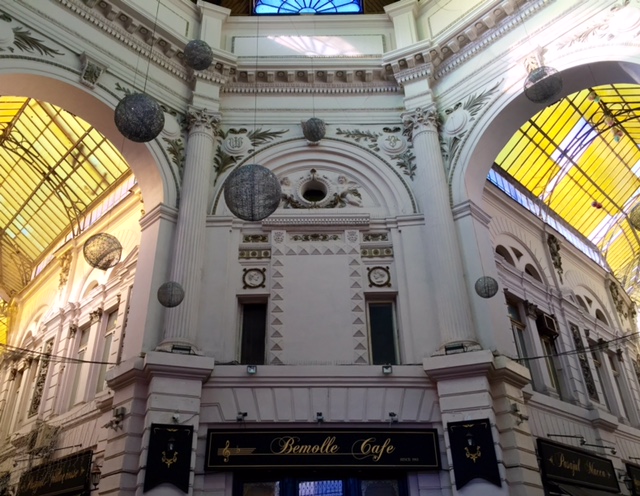You can hear the waterfalls before you see them on the Trail of Ten Falls. The rushing roaring piles of water plunge from high cliffs, or drop in sheets in the middle of the stream, or slip down the sides of the canyon. The path is a beauty pageant, meandering next to a creek.
When we find South Falls the sun is high in the sky, sending beams between the fir trees,
making rainbow halos with the mist in the air.
Everything is moist and mossy and middle-earthy, a moody instagram paradise. We are walking in the scents of the people we pass. Spices and soap, oranges and smoke, washed and unwashed. There are infants in carriers, and grandmothers with walking sticks, and all of us are breathing waterfalls. We come across a gigantic fallen fir tree next to the trail with all its rings exposed. When we stop to examine it I have to be reminded that trees grow from the inside out. I am startled to think I have forgotten this.
When we get back to the car after our four hour trek our son asks, "If a nuclear war had started while we were out hiking would we have known?" I'm fiddling with my phone, trying to find a signal, and a map, and the question just hangs there in the winter air.
Our route takes us home through the city of Mount Angel. There's a little more light left in the day, so we decide to go find the famous library at the abbey on top of the hill. Jason has been here before, and studied this building in school. He says it is round. He says it's where it all began.
We climb some steps from the parking lot and find ourselves on the cold deserted campus of the Mount Angel Abbey and Seminary. Across from where we are standing is a nondescript building, kind of squat and unpretty. It reminds me of my elementary school, or a place where janitors might store their mops. It is not round. Our son says, "I think that's it."
There is a young monk walking quickly towards the building from the opposite direction. His long black robes are flapping and blowing. When he gets to the door he takes out his keys. Then he turns and looks at us. We are only halfway there, but he waits. He says, "It looks as if you have come to see the library. The Lord must be on your side. Would you like to come in?"
And everything opens into light and white and sculpture and skylights. Books are circling in stacks in the roundness of the room. Oregon clouds float in the windows high above. Gary says, "It's so deceiving,"and you can sense the satisfaction of our cheerful cherub guide, because now he gets to say, "It's kind of like a monk, all ordinary and unassuming on the outside, but ahhhh, when you go inside, that's where all the good stuff is."
Brother Alcuin is our monk, and he opens more doors for us, and makes us laugh because of the most particular way he has of putting together his words. In the little concert hall with the perfect acoustics he taps on the walls with a theatrical flourish. He finds the hidden panel to a secret room and turns his back to us to work on the lock. Then suddenly he says, "The Lord must look upon you with favor, it doesn't usually open this easily," as the thick metal door swings wide. There are books in the vault that are ancient and rare. Our black robed brother puts on white gloves and gently places his favorite volumes in the viewing stand. He hands us the magnifying glass so we can see impossibly tiny words from a long ago human hand. He is pleased and parental and proud.
Before we leave, Alcuin hands our son a glossy book about the library, and invites us to stay to hear the monks sing. He shyly says he believes it will be beautiful. The sun is setting behind the giant pine trees as we walk across the grass to the visitor center, where there will be coffee and cookies and warmth while we wait.
When the bells for vespers start ringing we head toward them, and go inside the church on top of Mount Angel to listen to Brother Alcuin and the rest of the monks chant ancient melodies back and forth. The music is calming and my mind is wandering. I'm thinking about re-ionizing molecules born in the crash and thunder of relentless torrents pounding the earth, about keys to locked doors in compassionate hands, about soft new wood pushing outward against scarred and ragged bark.
































































